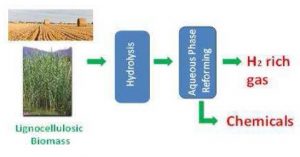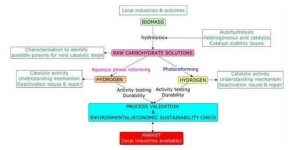1. SCORE2 – Solar-driven COnveRsion of CO2 with HP-HT photorEactor
Sponsored by MUR in the frame of the call PRIN: PROGETTI DI RICERCA DI RILEVANTE INTERESSE NAZIONALE – Bando 2022 PNRR with 233991 Euro (November 2023 – October 2025)
Netional Team Leader: Prof. Ilenia Rossetti, in collaboration with Prof. Gianguido Ramis (Università di Genova), Prof. Michela Signoretto (Università di Venezia), Prof. Barbara Bonelli (Politecnico di Torino).
Abstract of the project:
The photoconversion of CO2 through solar energy is the most challenging application in photocatalysis, due to the high stability of this compound and slow kinetics of a multi-electron transfer reaction. Limited reactivity is reported both in liquid and gas phase, also due to poor CO2 solubility in water and limited surface adsorption of CO2.
SCORE2 pursues the ambitious objectives to i) regenerate valuable chemical compounds in a fully circular approach; ii) convert CO2 to regenerated fuels and chemicals; iii) store solar energy. We will demonstrate an integrated process for the photocatalytic reduction of CO2 in gas and liquid phase exploiting efficiently the solar light spectrum through smartly engineered semiconductors, prepared by means of advanced synthesis techniques and exploited in an unconventional photoreactor.
Advanced solar sensitive materials will be synthetised and thoroughly characterised by means of different complementary approaches. A new generation of upconversion (UC) hybrid nanomaterials (NMs) relying on Triplet-Triplet Annihilation (TTA) will be designed by POLITO to exploit solar light. Compared with state-of-the-art, such NMs have the great advantage of working with non-coherent and relatively low-intensity incident light (ca. hundreds of mW/cm2), making them particularly promising for solar applications. On the other hand, mixed oxides with perovskite structure revealed very promising for this application through in silico design and will be exploited by UNIVE by innovative synthesis methods. UNIVE and POLITO will be also in charge of the physical chemical and spectroscopic characterisation of all the catalysts.
Testing for the photoreduction of CO2 will be carried out at UNIMI by means of a unique device operating at high pressure and temperature (HP, up to 20 bar, and HT, up to 100°C). This gas/liquid/solid photoreactor will allow operating in continuous mode. High pressure photoreactors are very challenging due to the need of a pressure-resistant vessel, but equipped with specially designed transparent quartz windows. Additionally, it uses the beneficial effect of high temperature to fasten mass transfer and kinetics.
Finally, the best performing materials will be deepened through advanced spectroscopic and optical characterisation by UNIGE, who will be also in charge of understanding the role of different hole scavengers to boost the reactivity, besides a broader investigation on the reaction mechanism. The fusion between advanced materials design and unconventional reaction conditions is the key to boost the productivity by orders of magnitude even by using very simple, robust and inexpensive photocatalysts, as already successfully demonstrated by us at lab scale. Indeed, high pressure improves the solubility in water (when operating in gas/liquid/solid phase) and surface adsorption of CO2, boosting kinetics thanks to increased concentration of the reactant over the catalyst.
2. AGRITECH NATIONAL CENTER
Sponsored by MUR in the frame of the European Union Next-GenerationEU call (PIANO NAZIONALE DI RIPRESA E RESILIENZA (PNRR) – MISSIONE 4 COMPONENTE 2, INVESTIMENTO 1.4 – D.D. 1032 17/06/2022, CN00000022). In particular we are active in Tasks 8.2.3, 8.3.2 e 8.4.1 to develop catalyst and prototype for the direct methanation of biogas, to develop a system for the removal of greenhouse gases from stables and for the process design and economic assessment of both systems. Globally we received a contribution of ca. 300000 Euro (September 2022 – August 2025).
3. SCORE – SOLAR ENERGY FOR CIRCULAR CO2 PHOTOCONVERSION AND CHEMICALS REGENERATION
Funded by Fondazione Cariplo for 300.000 Euro (March 2022 – February 2024)
PI: Prof. Ilenia Rossetti, in collaboration with Prof. Gianguido Ramis (Università di Genova), Prof. Michela Signoretto and Prof. Federica Menegazzo (Università d Venezia), Prof. Linda Barelli, Luca Gammaitoni and Dr. Alessandro di Michele (Università di Perugia), Dr. Riccardo Rurali (Institut de Ciència de Materials de Barcelona, ICMAB-CSIC).
Visit the SCORE page!
4. Hub One Health
I. Rossetti is responsible for the Chemistry Dept. of this Hub funded for 2022 in the frame of the Great Challenges of Univerity of Milan.
5. REWIND: Design of circular industrial processes for the valorisation of wastes as sustainable raw materials.
Project funded by Programma Operativo Nazionale (PON, MUR) “Ricerca e Innovazione” 2014/2020 , Azione IV.4 “Dottorati e contratti di ricerca su tematiche dell’innovazione” e IV.6 “Research contracts on Green Topics” with a RTDA reseacher position for 3 years (2022-24)
6. Solar driven valorisation of CO2 to chemicals and fuels
Italian coordinator of the project funded by Royal Society (UK) International Exchanges 2019 Round 2 (IES R2 192278). Dec. 2019 – Nov. 2022. Partners: Imperial College London (UK), Cardiff University (UK). (£12000)
7. Mitacs Globalink Research Award, Canada
Project supporting the mobility of Chenxu Shi (Calgary University) for 3 months at University of Milan (6000 CAN$)
8. Transition grant
Grant supporting the good performance for a EU proposal, evaluated in class A but not awarded due to exhausted funds (2019-20, 15000 euro).
9. DeN – Innovative technologies for the abatement of N-containing pollutants in water
Awarded by Cariplo Fundation with 240,000 Euro (March 2016 – February 2019)
Principal investigator Prof. Ilenia Rossetti, in collaboration with Prof. Gianguido Ramis (University of Genoa) and Barbara Bonelli (Politecnico di Torino)
Visit the DEN website!
The development of effective methods for the abatement of some harmful pollutants from waste waters and from hydric resources is a challenging task. Nitrogen containing compounds, such as inorganic ammonia, nitrites and nitrates, and some organic N-containing compounds (dyes, pesticides, drugs, etc.), are harmful contaminants for drinking water, inducing acute and/or chronic diseases, especially affecting infants and children. Furthermore, when released in waste waters they contribute to eutrophication, or possibly contaminate ground water. This is particularly relevant in agriculturally intensive zones and in the case of some relevant industrial processes involving e.g. nitration reactions.
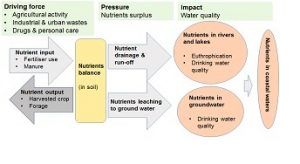
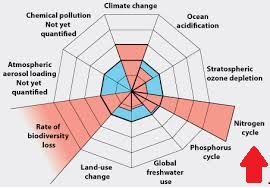
In the present project, we aim at developing innovative processes for the abatement of N-containing compounds, focusing on selectivity towards innocuous N2, to be applied for the treatment of waste waters to meet legislative specifications. The same processes, properly adapted and sized, may be also extended to the treatment of drinking water, for its potabilisation in particularly critical areas.
We will take advantage of the group experience in the development of unconventional catalytic and photocatalytic processes to propose a combined strategy for the elimination of all the mentioned species. This is a critical issue, because low abatement efficiency for N-containing pollutants has been evidenced when monitoring the depuration capability of Lombardy region, especially when dealing with small, decentralised plants (60-66% vs. a regional target of 75%).
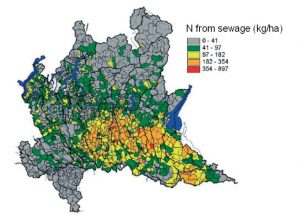
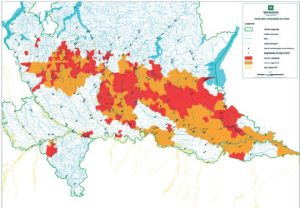
In particular, we will deal with the following approaches to the problem:
– Photoreduction of nitrates and nitrites.
– Photo-oxidation of NH3
– Photodegradation of N-containing organic compounds representing persistent pollutants in water. Some examples of dyes, pesticides and drugs will be considered in this frame.
10. UP – Unconventional Photoreactors
Awarded by Cariplo Fundation and Regione Lombardia with 55,000 Euro (October 2016 – July 2018)
Principal investigator Prof. Ilenia Rossetti
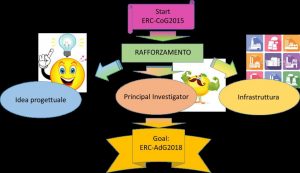
The grant was awarded because I. Rossetti presented a proposal for an ERC Consolidator grant in 2015, which was judged of very high quality by the reviewers. Therefore, this measure is intended as a reinforcement of the idea and of the researcher to become more competitive for a future ERC grant.
The project focuses on the sizing, design and modelling of unconventional photoreactors for different applications, mainly for the abatement of N-containing pollutants from water.
11. HERCULES – HEterogeneous Robust Catalysts to Upgrade Low valuE biomass Streams
Awarded by MIUR (PRIN2015) February 2017 – January 2020
Principal investigator Prof. Gianguido Ramis for the Unit UniGE, national coordinator Prof. A. Vaccari (UniBO)
The overall project aims at developing robust catalysts for the exploitation of biomass. Our research unit, located @UniGE, will focus on the development of a photocatalytic process to valorise sugar-containing solutions (waste or hydrolysed from waste biomass) for the production of hydrogen and fuels.
